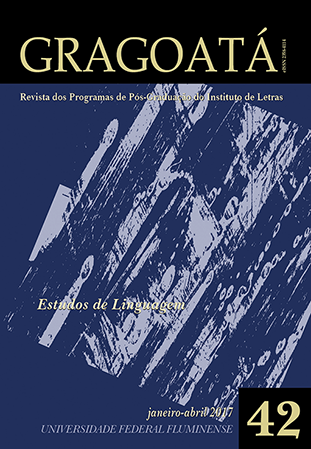The language of / in Brazil: effects of memory and history
DOI:
https://doi.org/10.22409/gragoata.v22i42.33475Keywords:
Language. Memory. History.Abstract
In this study, we develop a reflection that aims to understand the constituent memory of discourse about language of / in Brazil in the early twentieth century, from the following works: A defesa da língua nacional (1920), by Laudelino Freire, and A língua do Brasil (1947), by Gladstone Chaves de Melo. Through these discursive materialities, we are interested in observing how the history and memory affect and determine how the language of / in Brazil is signified in different socio-historical and ideological circumstances. The theoretical support which this work is based on is linked to the perspective of the History of Linguistic Ideas, articulated to the theoretical and methodological assumptions of Discourse Analysis from Pecheux.
---
DOI: http://dx.doi.org/10.22409/gragoata.2017n42a880
Downloads
Downloads
Published
How to Cite
Issue
Section
License
Authors who publish in Gragoatá agree to the following terms:
The authors retain the rights and give the journal the right to the first publication, simultaneously subject to a Creative Commons license CC-BY-NC 4.0, which allows sharing by third parties with due mention to the author and the first publication by Gragoatá.
Authors may enter into additional and separate contractual arrangements for the non-exclusive distribution of the published version of the work (for example, posting it in an institutional repository or publishing it in a book), with recognition of its initial publication in Gragoatá.

Gragoatá is licensed under a Creative Commons - Attribution-NonCommercial 4.0 International.














